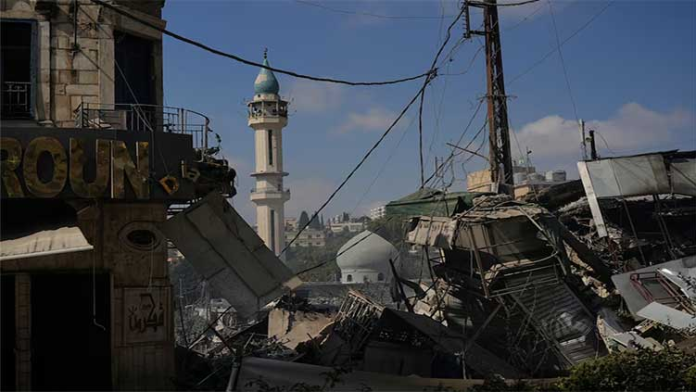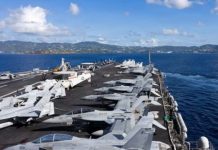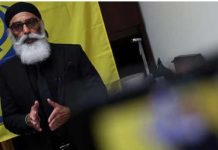JERUSALEM/DUBAI, OCT 14 (DNA) : Israeli Energy Minister Eli Cohen on Monday accused the United Nations’ UNIFIL peacekeepers in south Lebanon of being a “useless” force that failed to protect Israelis from Hezbollah attacks and called on it to withdraw as fighting ramps up.
“The State of Israel will do everything to ensure the safety of its citizens, and if the UN cannot help, at least it should not interfere, and move its personnel from the combat zones,” he said on X.
Israel and the United Nations have been trading accusations over the peacekeepers in south Lebanon, as Israel pushes its forces through the area in an attempt to wipe out Iran-backed Hezbollah and its military infrastructure.
The UN said Israeli tanks had burst into its base on Sunday, the latest allegations of Israeli violations against peacekeeping forces, that have been condemned by Hezbollah and by Israel’s allies.
Israel disputed the UN account and Israeli Prime Minister Benjamin Netanyahu called for the peacekeepers to withdraw, saying they were providing “human shields” for Hezbollah during an upsurge in hostilities.
The UNIFIL peacekeeping force said two Israeli Merkava tanks destroyed the main gate of a base and forcibly entered before dawn on Sunday. After the tanks left, shells exploded 100 metres (yards) away, releasing smoke which blew across the base and sickened UN personnel, it said in a statement.
The Middle East, meanwhile, remains on high alert for Israel to retaliate against Iran for an Oct. 1 barrage of long-range missiles launched in response to Israel’s assaults on Lebanon.
The Pentagon said on Sunday it would send US troops to Israel along with an advanced US anti-missile system as Israel weighs its expected retaliation against Iran.
Hezbollah denies it uses the proximity of peacekeepers for protection.
The Israeli military took foreign journalists into southern Lebanon on Sunday and showed them a Hezbollah tunnel shaft that was less than 200 metres away (650 feet) from a UNIFIL position, as well as weapon stashes that the troops found.
Brigadier General Yiftach Norkin said the tunnels were built a few years ago.
“We are actually standing in a military base of Hezbollah very close to the to the UN,” Norkin said, pointing to the shaft’s trap door in an area covered by undergrowth and overlooked by a UN observation post.
Since announcing its ground operation near the border, the Israeli military says that it has destroyed dozens of Hezbollah tunnel shafts, rocket launchers and command posts.
“We found several days ago a huge quantity of weapons originally coming from Iran and Russia. Brand new,” said Colonel Olivier Rafowicz. “They were prepared for attacking us and (launching) a large invasion into the north of Israel,” Rafowicz said, showing the journalists crates of weapons.
Reuters could not immediately verify these claims.
EXTENSIVE TUNNEL NETWORK
Hezbollah possesses an extensive tunnel network in southern Lebanon, both the group and Israel say. Israel estimates they extend for hundreds of kilometres. A Hezbollah field commander told Reuters last week that the tunnels “are the foundation of the battle.” Hezbollah has not immediately commented.
UNIFIL has said previous Israeli attacks on a watchtower, cameras, communications equipment and lighting had limited its monitoring abilities. UN sources say they fear any violations of international law in the conflict will be impossible to monitor.
The European Union’s member states have taken too long to condemn Israel’s attacks on UNIFIL soldiers in Lebanon, the European Union’s foreign policy chief Josep Borrell said on Monday, describing the attacks as “completely unacceptable”.
EU countries, led by Italy, France and Spain, have thousands of troops in the 10,000-strong peacekeeping mission in southern Lebanon, which has said it has repeatedly come under attack from Israeli forces in recent days
US Defense Secretary Lloyd Austin in a call on Sunday with his Israeli counterpart, Yoav Gallant, “reinforced the importance of Israel taking all necessary measures to ensure the safety and security of UNIFIL forces and Lebanese Armed Forces,” according to a readout of the call.
UNIFIL had sent the Israeli military a letter in early October, seen by Reuters, that said that Israeli military positions had been taken up so close to UN positions that they had effectively become “one position.” UNIFIL said this posed a serious threat to peacekeepers.
The conflict between Israel and Hezbollah resumed a year ago when the militant group began firing rockets at Israeli positions in support of Hamas at the start of the Gaza war and has sharply escalated in recent weeks.
Israel says its operations in Lebanon are aimed at securing the return of tens of thousands of its residents displaced from their homes in northern Israel.
On Sunday, Hezbollah said it attacked a camp of the Israeli military’s Golani Brigade in Binyamina in northern Israel with a “swarm of drones”.
Israel’s military said four of its soldiers were killed and seven severely injured in the incident. On Monday, the Israeli military’s chief of staff Lieutenant General Herzi Halevi said that attack was difficult and the results painful.

















